- Home
- Barbara Kingsolver
Pigs in Heaven Page 23
Pigs in Heaven Read online
Page 23
"Well, I was mad because you run off and got married first. And anyway I was sick of factory work."
"I'll tell you, Foster Greer wasn't anything to be jealous of. You've been a whole lot luckier in love than I ever was."
The two women sit still, watching slim brown bodies slip through air into water as if they were made for nothing more than this single amphibious act. Sugar sighs.
"He had shoulders just like that. Roscoe did. From carrying the ties."
"Railroad ties? That's a job."
"Mm-hmm. He used to cut ties and posts. Later on when we got married and come on back up here he cut cookstove wood. Just cut it right out of these woods around here. He'd sell it for fifty cents a rick. Now you get twenty-five dollars a rick."
"Isn't that something, what we used to pay for things?"
"Oh, Lordy! Remember when we worked in that mattress factory for fifteen cents a day?"
Alice laughs. "That was fun, though. More fun than you'd guess."
"No, what was fun was when we'd go to beer joints, or sneak in to watch them wrestling matches they organized in the barns."
"Oh, I liked those!" Alice says. "Those matches they have now on TV are just plain stupid. Like a costume party of grown-up men. I liked those tough-looking boys in the baggy shorts."
"You had a crush on that one, what was his name?"
"Rough and Tumble Ludwig. I did not." Both women cover their mouths and laugh.
"You know what I really loved?" Alice asks suddenly. "When we'd go out to the colored church with that girl Arnetta from the mattress factory."
"Your mama tanned our hides on that one," Sugar says.
"I didn't even care. I kept on going, even after you all left the farm. They sang gospel on Wednesday nights, and there was one woman in particular that always spoke in tongues."
"I've seen that, the speaking in tongues and the carrying on," Sugar says. "I wasn't much impressed."
"This one was different," Alice says, though she knows she can't explain it to Sugar. She leans back, closing her eyes and remembering, feeling the light from the creek playing on her face. That woman could be counted on. Her eyes would go soft and faraway, not agitated, and she would lay her hand on the head of a child, whoever happened to be near, because nobody was afraid, and she would speak out in a slow, meaty voice: "Belbagged oh Lessemenee! Yemett algeddy boolando!" And you would understand what she meant. Yes, sister, they would all cry. No one doubted she was receiving the spirit. In the years since, Alice, too, has seen the ones who shake and scream and roll their eyes back as if snakebit, but she has always doubted the sincerity of this. Anybody can get worked up, if they have the intention. It's peacefulness that is hard to come by on purpose.
Annawake stirs her coffee. Through the cafe window she can see Boma Mellowbug's bottle tree, with hundreds of glass bottles stuck onto the ends of its limbs. It's a little thin at the top where no one can reach, but once in a while someone from the volunteer fire department will bring a ladder and move some bottles to the upper branches to even things out.
She reaches for the cream pitcher and knocks over the sugar bowl at the same instant she sees the woman who must be the grandmother. She's wearing running shoes and polyester pants and a bright, African sort of shirt, and she is trying not to look lost. Annawake taps on the window and waves. The woman raises her head like a startled animal and changes her course, heading across the street toward the cafe. Annawake tries to spoon the sugar she has spilled back into the bowl. By the time Alice gets there, Annawake has created a crater in the small white mountain in the center of the table.
"I spilled the sugar," she says.
"Sugar's cheap," Alice says. "You could do worse things."
Annawake is caught off guard, forgiven before they even start. "Sit down, please," she says. She takes off her reading glasses and stands up to shake Alice's hand just as Alice is moving to sit down. They both bend awkwardly to accommodate the difference, and Alice laughs.
"I'm sorry. I'm nervous as a barn cat," she says, sliding into the booth across from Annawake.
"Me too," Annawake confesses. "How long have you been in Heaven? You finding your way around all three blocks of it?"
"I can't complain. Sugar's looking after me. My cousin. I mentioned her on the phone, didn't I?"
Annawake feels wary. She'd said Sugar Hornbuckle on the phone, but she hadn't said cousin. "So you and your daughter have ties here in the Nation?"
"Oh, no. Sugar and me grew up together down South. But I never knew Roscoe till he hollered howdy at me two days ago in the bus station."
"Oh," Annawake says, and they look each other in the eye.
Alice exhales slowly. "Well. I had all this stuff to say, that I was practicing on my way over here. I was supposed to start out being real high and mighty, but that's never been my long suit."
Annawake smiles. She has seen so many people show up for court armored in suits and lies. But this bright-eyed little old lady turns out for Greer vs. Fourkiller in an African-print dashiki from Wal-Mart, and an attitude to match. "I think I know what you were going to say," Annawake tells her. "Can I give it a shot?"
"Go ahead."
"Miss Fourkiller, you've got no business butting into our lives this way. You might think you know what's best for our little girl, because she's Indian and you are too, but that's just one little tiny part of what she is. You weren't there while she was growing up, and it's too late to be claiming her now, because she's already a person in our family."
Alice frowns. "I'll swan."
"Coffee, hon?" the waitress asks as she fills Alice's cup. She's a very short, very broad woman with blunt-cut black hair and a face as round and flat as a plate. "I don't think I know you. I'm Earlene."
"Earlene, this is Alice Greer," Annawake says. "She's come to town on some business."
"Uh-oh," Earlene says, noticing the sugar volcano.
"I made a little mess," Annawake admits.
"You know what that means. Means somebody's a-gettin' a new sweetheart." Earlene looks at the two women, beaming. "Which one, you reckon? I know Annawake's on the market. How about you, you married, hon?" she asks Alice.
"Not so's you'd notice," Alice replies. Earlene laughs so hard her bosom heaves and the coffee slides dangerously in the glass pot.
"I'll bring back a rag directly and get that up," she says. "I'm sorry if it takes me awhile to get back to you. I'm the only one here today. You all want the soup of the day? It's beef barley, it's real good."
"That would be fine," Alice says, and Annawake nods. Their water glasses vibrate with Earlene's footsteps as she makes her way back to the kitchen.
"There's one thing you left out," Alice says. "In my speech."
"What's that?" Annawake blows into her coffee.
Alice looks out the window when she speaks. "She was abused."
"I know. I'm sorry."
"Sorry?" Alice takes her straight on now. "That's not enough. You don't know what that child goes through. She's still not over it. Whenever she feels like she's done something wrong, or if she thinks Taylor's leaving, she just... I don't know what you'd call it. It's like her body's still there but her mind gets disconnected some way. It's awful to watch."
"It must be," Annawake says.
"What I think," Alice says, folding her paper napkin, "is that you people had your chance, and now it's Taylor's turn. And she's doing a good job."
For the first time Annawake feels a stirring of animosity. "When you say 'you people,' who do you mean exactly? Indians in general, or just the Cherokee Nation?"
"I don't know. I just can't see how a thing like that could happen to a little baby girl."
"I don't know why it happens here, because we love our children more than money. And there are almost always enough good-hearted people in a family to fill in for the hardship cases."
"Everybody loves kids, that's nothing new under the sun," Alice states. "Except the ones that don't."
"I
don't think you understand what I mean." Annawake's jaw tenses with this familiar frustration: explaining her culture to someone who believes America is all one country. She thinks about what she wants to say, and sees in her mind family, a color, a notion as fluid as river. She tells Alice, "I used to work at the Indian hospital at Claremore, checking people in. Sometimes it would be years before we'd get straight who a kid's mother was, because one aunt or another would bring him in. Maybe the mother was too young, so another family member raised him. It's not a big deal who's the exact mother."
Alice blinks, taking this in. "So with all this love going around, how does it happen that somebody walks up to my daughter's parked car one night and gives a baby away?"
Annawake watches two girls passing by outside on the street, Flossie Deal's granddaughters, she thinks. They are walking fast, with earnest, bobbing heads, the way only adolescent girls can move. Annawake also had speeches in her head, and she too has forgotten them, or lost her introductions. "God knows why," she says. "What's happened to us is that our chain of caretaking got interrupted. My mom's generation." Annawake feels her stomach harden. "Federal law put them in boarding school. Cut off their hair, taught them English, taught them to love Jesus, and made them spend their entire childhoods in a dormitory. They got to see their people maybe twice a year. Family has always been our highest value, but that generation of kids never learned how to be in a family. The past got broken off."
"Well, that's a shame," Alice says.
"Yeah. The ones my age are the casualties. We have to look farther back than our parents, sometimes, to find out how to behave." Annawake feels unsteady. "The woman who gave Turtle to your daughter, I think I could probably tell you her sad alcoholic one-bad-man-after-another story. She gave Turtle up because she had no idea how to save a baby from repeating that life. But I also know that baby fell out of a family that loved her, and she's missed."
Alice's expression changes. "You know that for sure? There's relatives here that want her back?"
Annawake touches the pad of her index finger into the sugar on the table, making a perfect circle, deciding how much to tell. "Yes," she says finally. "I could have told you, before I knew anything about the specifics of this case, that somebody here was missing that child. And it turns out I'm right. I found out just recently as a matter of fact, more or less by accident. At a hog fry. People talk about things here, and it comes around."
"Well," Alice says, glancing around, nervous again.
"It doesn't really change anything. The law is still the law, Turtle's adoption is invalid, whether relatives come forward or not. Our job is to figure out what's the next step."
"Does Turtle have any say-so in all this?"
"Sure she does. And I'm sure she would say she wants to stay with Taylor. I understand that." Annawake begins pushing the sugar into another shape, making a point on the bottom of the circle. "We're not going to decide anything today. The best we can hope for is just to get acquainted."
Alice takes the offensive. "What happened to your mama, after the boarding school?"
Annawake stares at the heart shape she has drawn in sugar on the table, wondering what in the world it is doing there. "Bonnie Fourkiller;" she says. "Tried hard to be an all-American girl, but she had none of the assets and all the liabilities. Pregnant at sixteen with my brother Soldier, who they tell me was born blue and died pretty quick. She married a Kenwood kid with less talent for making money than she had for conceiving boys. Three more brothers, then me and my twin, Gabe. What I remember is Dad always somewhere tracking down work, and Mama begging us for mercy and drinking seven days a week. Lysol on Sunday mornings, so she wouldn't smell like liquor in church."
"Lord," Alice says.
"She was institutionalized at the age of thirty-five. But I was lucky, I had lots of people looking after me. My dad and brothers, and mainly my Uncle Ledger. He's a medicine man. Not a doctor. Kind of a minister. Have you heard of the stomp dances?"
"I've seen those turtle shells. Looks like that would be a chore, to dance with all that on your legs."
Annawake laughs. "It's work, but it's not a chore. I did that. But Uncle Ledger decided I would be the one of us who'd learn the white world. My brothers could do their reckless things, but I had to learn to listen to my head, every time. He made me speak English, and he pushed me to do well in school. He thought we needed an ambassador."
"The ambassador? That's what you are? Whatever you told my daughter Taylor scared her to death. She's a mess, all uprooted, and now she can't even make her payments."
"It didn't cross my mind that she would pack up and move."
"Well, she did. Last time I talked to her she didn't sound like herself. She's depressed. It's awful what happens when people run out of money. They start thinking they're no good."
"See that guy over there?" Annawake points across the street to the hardware store where Abe Charley is standing out front in his horsehide suit, talking to Cash Stillwater.
Alice leans, to look. "What's that, a cowskin he's got on?"
"Horsehide. There's a rendering plant over toward Leech where you can get horse leftovers pretty cheap. Abe made that suit himself. He's pretty proud of it."
"Taylor's boyfriend wears some odd getups, from what he's told me. But to tell you the truth, not as bad as that horsehide. Taylor just bought new school clothes for Turtle instead of paying her bills. She was scared to death of Turtle looking poor at school. You know how it is."
"Luckily I don't. I mean, growing up here, you don't have to bother much with pretending you're not poor."
Alice is tracking Abe Charley's flamboyant hide as he crosses the street. Annawake refines the point on her sugar heart. "People say Indians are ungrateful welfare recipients, but what they really mean is we don't act embarrassed enough about being helped out. The young people like me, the radicals, we'll say it's because we had everything stolen from us and we deserve the scraps we're getting back. And that's true, but it's not the point. The old people around here, they're not thinking about Wounded Knee, they're just accepting what comes their way. For us, it's the most natural thing in the world to ask for help if we need it."
Alice has finally gotten her fingers into the sheet of sugar that is spreading across the table. She draws a pig, then puts a fence around it. "I was noticing that about my cousin Sugar," she says. "We were walking along and she saw some poke growing down in the ditch, and she just went right down there and got it. Didn't care who drove by and saw. I was thinking, 'Now, I'll eat poke if I have to, but I'd hate for anybody to see I was that hard up.' "
Annawake smiles, remembering summers of gathering greens with her uncle.
Alice puts another fence around the pig.
"Your cousin Sugar was my mother's best friend," Annawake says. "Ask her sometime if she remembers Bonnie Fourkiller."
"You had that brother that got sent away, didn't you?"
Annawake is startled to feel tears in her eyes. "How did you know that?"
"It was in that letter you wrote Jax. He read it over the phone."
Annawake wipes her nose with her napkin. "My other brothers are still around here, and a slew of nieces and nephews. My dad is still living, he's over in Adair now. What about you? Do you have other kids besides Taylor?"
"Nobody but Taylor. No son, no daddy, and no husband to speak of."
"None to speak of?"
"Well, I had me one, Harland, but he never talked. It was like trying to have a conversation with a ironing board. He just wanted to watch TV all the time. That's what ruint him, really, I think. TV does all the talking for you, and after a while you forget how to hold up your end."
Annawake smiles. "Interesting theory."
"So I left him. I doubt he's noticed yet. Now it's just back to me and Taylor and Turtle. Seems like we're doomed to be a family with no men in it."
"Could be worse. You could have a family with no women in it, like I grew up in."
"Now that's true
, that would be worse."
They fall quiet. The window gives their eyes a place to go when they need to take a rest from each other.
"If you don't mind my asking," Alice pipes up, "what's going on with that tree over there?"
"That's Boma Mellowbug's bottle tree," Annawake says. "Our little thing of beauty. Boma is, I guess you'd say, the town lunatic."
"I think maybe I saw her. In a dress and a ski hat?"
"That was Boma. You really have to be sure you don't run over her with your car. Sometimes she'll stand in the middle of the street and have a conversation with the oaks. But everybody's crazy about Boma."
"She did all that by herself?"
"No. She got it going. Back when I was little, she started sticking old empties down over the ends of the branches of that redbud. And pretty soon somebody else would come along and add another one, and then we all got into it, keeping our eyes peeled for something special. Once I found an old blue milk bottle in a ditch, and another time, one of those fancy glass cups they used to have up on the electric lines. I couldn't wait for Uncle Ledger to drive me over here in his truck so I could put my things on the tree."
"Well," Alice says, "it's different."
"Not for here. For here it's just kind of normal." She laughs. "One time in law school we were discussing the concept of so-called irresponsible dependents. That a ward of society can't be a true citizen. I wanted to stand up and tell the class about Boma and the bottle tree. That there's another way of looking at it."
"What's that?"
"Just that you could love your crazy people, even admire them, instead of resenting that they're not self-sufficient."
"Why didn't you?"
Annawake shrugs. "There are things I can't explain to white people. Words aren't enough."
"Well, that's it, isn't it?" Alice says. "If we could get it across, we wouldn't be sitting here right now."
Earlene comes back carrying two bowls of soup and grinning from ear to ear. "Oops," she says, "I forgot to get up that sugar." She lumbers briskly away singing, "Here comes the bride!"
Annawake stares at Alice, the woman from the family without men, and hatches the most reckless plan of her life.
23
Secret Business
LETTY IS STANDING IN HER garden with a butcher knife when Annawake drives up. She looks formidable, but Annawake kills the engine anyway and makes her way through the bean patch. She waves Letty's pie plate in the air. "I'm returning this to you," she says.

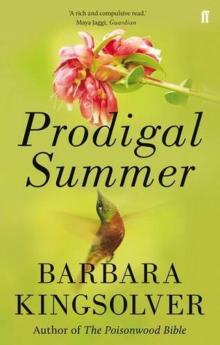 Prodigal Summer: A Novel
Prodigal Summer: A Novel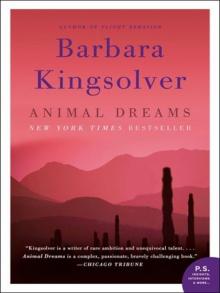 Animal Dreams: A Novel
Animal Dreams: A Novel The Poisonwood Bible
The Poisonwood Bible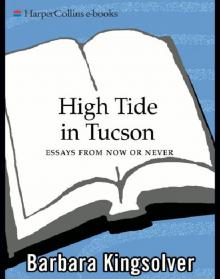 High Tide in Tucson
High Tide in Tucson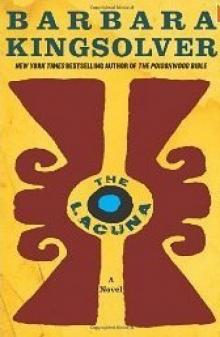 The Lacuna
The Lacuna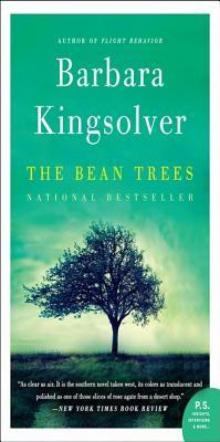 The Bean Trees
The Bean Trees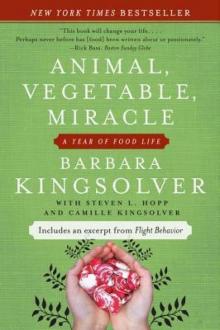 Animal, Vegetable, Miracle: A Year of Food Life
Animal, Vegetable, Miracle: A Year of Food Life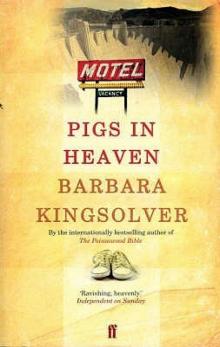 Pigs in Heaven
Pigs in Heaven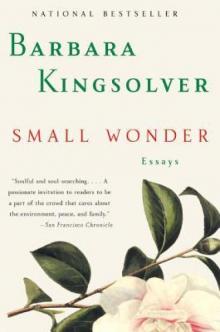 Small Wonder
Small Wonder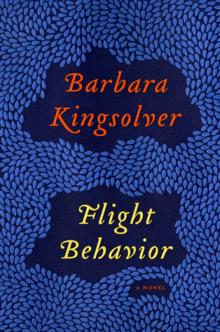 Flight Behavior
Flight Behavior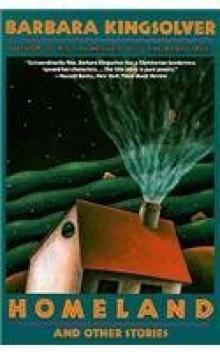 Homeland and Other Stories
Homeland and Other Stories How to Fly (In Ten Thousand Easy Lessons)
How to Fly (In Ten Thousand Easy Lessons) Unsheltered
Unsheltered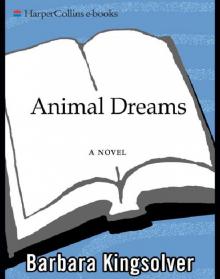 Animal Dreams
Animal Dreams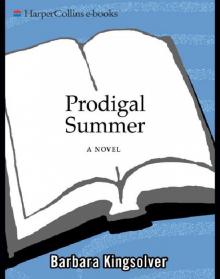 Prodigal Summer
Prodigal Summer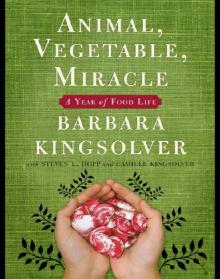 Animal, Vegetable, Miracle
Animal, Vegetable, Miracle